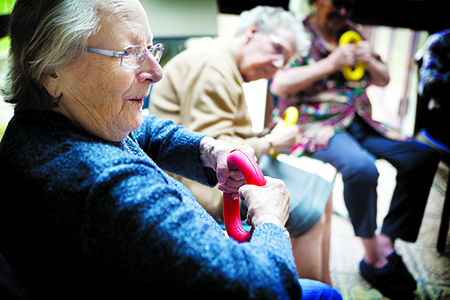
Two-plus years of lost socializing, exercise and mental activities may have hastened the decline of many people with dementia and placed an additional burden on their caregivers, eldercare clinicians say.
Recent studies show — and the geriatricians confirm — that high COVID-19 infection rates, a shortage of healthcare providers and isolation have disproportionately affected the health and well-being of these patients and their communities.
Social isolation due to the pandemic led to greater severity of neuropsychiatric and behavioral disturbances in older adults with dementia, according to a new report in Neurology Advisor. This includes increases in depression, anxiety, delusions and hallucinations, one study found.
New visits for impairment up
Although some patients with dementia have shown resilience, re-engaging with their old activities and picking up where they left off, there are plenty of signs that more support is needed.
“We have seen a dramatic rise in the number of patients presenting for initial complaints of cognitive impairment in our memory disorders program over the course of the pandemic,” Ian C. Neel, MD, a geriatrician with the University of California, San Diego School of Medicine, told the news outlet.
The cancellation of nonpharmacologic dementia intervention modalities played a big part in this outcome, he said. Exercise groups were canceled and adult day centers closed, for example, halting the ability to engage in activities shown to be beneficial to cognitive health.
Illness increases cognitive decline
The number of severe COVID-19 cases among this mostly older group of patients also has taken a toll on cognitive function, said dementia-care specialist Michelle T. Panlilio, DNP, GNP-BC, of the University of California, Los Angeles. Patients with dementia are known to have a significant decline in functioning when hospitalized. The pandemic not only exacerbated this problem, but the shortage of healthcare workers left many community-dwelling patients without support from agencies.
Meanwhile, both these patients and those who live in nursing facilities suffered severely from the effects of isolation, which in turn accelerated mental health concerns and resulted in an unprecedented need for antidepressant and antipsychotic medications, Panlilio said.
“The amount of meds we had to prescribe in the beginning was astronomical,” she said.
Addressing the problem
Although COVID-19 cases are rising once again, it is still important to encourage patients to begin returning to their pre-pandemic activities while adhering to COVID-19 mitigation strategies. This might include wearing a mask, even in places where mask mandates have been lifted, for example, Neel recommended.
Panlilio added that although clinicians excel at providing medical care, they could do better with providing paths to socialization and ties to the community.
“Patients with dementia, especially in the advanced stages, really need much more social engagement,” she said. For those who are not in nursing facilities, which have planned activities, clinicians can support referral to adult day centers and memory care centers, she said.
Ashwin Kotwal, MD, MS, of the San Francisco VA Medical Center agreed.
“Patients and families are in need of clinicians who can advocate for safe socializing and programs that can assist caregivers and help them recover from burnout experienced during the pandemic,” he said.
Related articles:
COVID-19 affects dementia complications, survey finds
Trauma-informed care needed for LTC residents with dementia, authors contend
Mortality rate spiked for LTCF residents with dementia during pandemic: study




